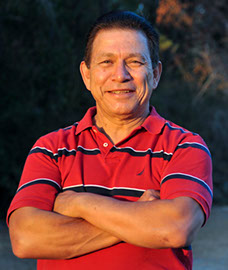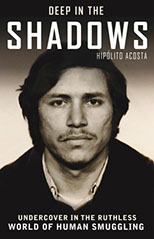
Secret Agent Man
Deep in the Shadows: Undercover in the Ruthless World of Human Smuggling
By Hipolito Acosta (Arte Publico Press, 2017)
Hipolito Acosta’s Deep in the Shadows reads like the swan song of a secret agent turned civil servant. In his third memoir, one of the most highly decorated officers in the history of U.S. Customs and Border Protection details the sordid world of human smuggling as well as the celebratory high of witnessing hard working immigrants become U.S. citizens.
As a young Mexican-American growing up in Redford, TX, which he describes as “a small dot of a town,” Acosta  saw that the way to a better life, indeed to the American dream, would be via military service. As soon as he could he joined the Navy and, upon returning from a four-year-stint, became a Border Patrol agent in Marfa, TX. Soon thereafter, he and his young wife Terrie moved to Chicago so he could pursue work as an undercover INS agent.
saw that the way to a better life, indeed to the American dream, would be via military service. As soon as he could he joined the Navy and, upon returning from a four-year-stint, became a Border Patrol agent in Marfa, TX. Soon thereafter, he and his young wife Terrie moved to Chicago so he could pursue work as an undercover INS agent.
At his new job Acosta viewed his Latino-looks and ability to speak Spanish as a definite asset, writing: “Let’s face it: until I showed up, the department consisted predominantly of Anglo guys and they stuck out like Snow White amongst the seven dwarves when they entered the neighborhoods they were trying to infiltrate.”
The young agent was good at blending in with the criminal element he was up against---good enough, in fact, that a federal judge once mistook him for the defendant on trial. Acosta found humor in the judge’s prejudiced mistake and relished the opportunity to stand before the bench and say:“Your honor, I am the undercover agent!” Mortified, the judge asked to see Acosta in her chambers, whereupon she served him coffee, apologized, and from then on seemed to offer him special attention whenever he needed a warrant signed.
Much of Acosta’s luck, in what he admits to being a wildly dangerous line of work, seems to have come from cashed in favors. These favors could come from the courts or the criminals. After agreeing to refrain from handcuffing a man named Margarito Flores in front of his family, Acosta’s kindness was returned when he received a county jail call from the criminal warning him of prisoner talk suggesting that there would soon be a hit out on him. “You have a lot of enemies out there, Hipolito,” said Flores, “I heard rumors in jail that some of the people you busted are going to try to kill you, so you better watch yourself. I’m only passing this information on to you because of what you did for me and my family. I don’t want any favors. I don’t want to be your friend. I will not call you again.”
Listening to the cautionary words of a convict, Acosta took the proper steps to secure safety for himself and his family. Throughout Deep in the Shadows, Acosta makes frequent reference to how important the well-being of his wife and children are to him. But there is simply no escaping the reality that this business of going in and out of dangerous countries and mixing with immoral and vengeful folks for decades must have been more important to him than living what could have been an easier but far less exciting life.
Acosta comes off like a streetwise Forrest Gump, a well-intending character who is privy, and perhaps even deeply connected, to events that shaped modern migrant policy. Understandably, he has a lot to say about who gets in and who gets to stay in the country.
Acosta is critical of President Jimmy Carter’s acceptance of what he calls “Castro’s castoffs,” describing the influx of Cubans in the 1980’s as a flood of mostly criminal and mentally ill people. Regarding Elian Gonzalez, he seems genuinely incensed that his country would spend $1.8 million “to reunite a father from a communist country with his Cuban child.”
of Cubans in the 1980’s as a flood of mostly criminal and mentally ill people. Regarding Elian Gonzalez, he seems genuinely incensed that his country would spend $1.8 million “to reunite a father from a communist country with his Cuban child.”
Despite his politics, which seem decidedly conservative, Acosta’s deep respect for what everyday migrants suffer paints him as the kind of man you might want for this kind of job. After decades in a career that took him from small town Texas to the tough streets of Chicago, and on to high INS positions in the Philippines and Mexico City, Acosta stepped down from his truly dangerous work to take a bureaucratic role in processing migrants in Houston. Here he made his mark by making time saving changes to the application process and by adding a celebrity element to the swearing in ceremony.
Speaking of the oath-taking experience, Acosta said: “Except for special occasions like Christmas time, the practice at the office was to herd them in, swear them in, give them certificates and move them out.” Not satisfied with this lackluster ritual, Acosta would personally attend every swearing in ceremony he could and manage to get prominent personalities such as George Foreman and Manny Acta to speak before the new U.S. citizens.
As honest and assuring as Deep in the Shadows can be, there remains an alarming aspect to Acosta’s autobiography. Although his cheerful asides about the downtime of deep cover Border Patrol work, of sharing booze with follow undercover agent’s and even providing a cookout for a murderous Cuban criminal who had spent most of his young manhood behind bars, are certainly the stuff of TV shows like Miami Vice and Baretta, they do call into question real fears that are linked to the power of a badge.
Reading Deep in the Shadows, one feels grateful that Acosta appears to be a kind-hearted, patriotic, hardworking family guy, who does not take bribes and can hold his liquor. But if these qualities are as rare in law enforcement as they are in the civilian world, than legal residents and undocumented people alike may be in more trouble than they know.
Roberto Ontiveros